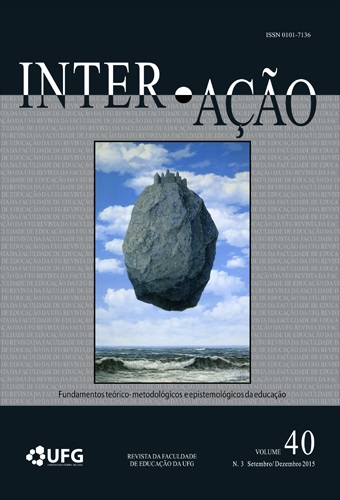ENTRE A LINGUAGEM E O SABER-FAZER: UMA PROPOSTA PARA A COMPREENSÃO DO CONHECIMENTO PRÁTICO
DOI:
https://doi.org/10.5216/ia.v40i3.35613Keywords:
Conhecimento prático. Paradigma da Corporeidade. Saber-fazer. Etnografia.Abstract
O artigo tem como objetivo formular alternativas para transpor as dificuldades de se em pesquisar o fenômeno da aprendizagem na prática, entendido como saber-fazer. Para isso, constroem-se articulações teóricas que colocam em paralelo uma perspectiva fenomenológica, baseada no paradigma da corporeidade, e uma abordagem que reúne linguagem e prática, qual seja a teoria das metáforas incorporadas. Entende-se que tais dificuldades estão orientadas em torno de pressupostos ontológicos da ciência moderna, quais sejam: os limites entre objetividade e subjetividade e as formas de representação e comunicação do conhecimento. Conclui-se que a pesquisa etnográfica desenvolvida segundo modelos fenomenológicos, tais como as categorias da etnografia da experiência é uma proposta metodológica adequada para o estudo do conhecimento prático.
Downloads
Downloads
Published
How to Cite
Issue
Section
License
Inter-Ação uses the Creative Commons Attribution 4.0 License for Open Access Journals (Open Archives Initiative - OAI) as the basis for the transfer of rights. Open access means making documents available on the Internet free of charge, so that users can read, download, copy, distribute, print, search, or link to the full text of documents, process them for indexing, use them as input data for software programs, or use them for any other lawful purpose, without financial, legal, or technical barriers.
Authors publishing in this journal agree to the following conditions:
1) Authors retain copyright and grant the journal the right of first publication, with the work simultaneously licensed under the Creative Commons Attribution License, which permits redistribution of the work with attribution and first publication in this journal.
2) Authors are permitted to enter into additional, separate agreements for non-exclusive distribution of the version of the work published in this journal (e.g., for publication in an institutional repository or as a book chapter), with attribution and first publication in this journal.
3) Authors are permitted and encouraged to publish and distribute their work online (e.g. in institutional repositories or on their home page) at any time before or during the editorial process, as this may generate productive changes as well as increase the impact and citation of the published work.















